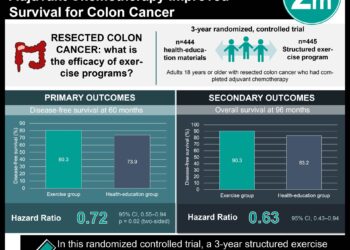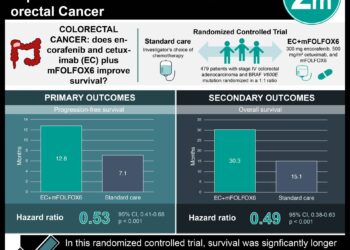Patients with advanced adenomas are at increased risk of developing colorectal cancer
1. Patients with advanced adenomas identified on flex sigmoidoscopy had a significantly increased risk of death from colorectal cancer (CRC) compared to those with no adenomas.
2. There was no difference in cumulative CRC incidence in patients with nonadvanced adenomas as compared to those with no adenomas.
Evidence Rating: 1 (Excellent)
Study Rundown: Colorectal cancer (CRC) screening aims to reduce the incidence of CRC by removing precursor lesions. However, the subsequent risk of developing of CRC has not been well studied. In this randomized screening trial, patients with advanced adenomas detected by flex sigmoidoscopy (FSG) were at significantly increased risk of CRC compared to those with no adenomas. Additionally, patients with proximal compared to distal advanced adenomas were at significantly increased risk for subsequent CRC. For the patients who went on to develop CRC, more than half of them were diagnosed in early stages. Even with early diagnosis, those with higher risk lesions had significantly higher mortality than those with no adenomas and nonadvanced adenomas. There was no difference in cumulative CRC incidence in patients with nonadvanced adenomas as compared to those with no adenomas.
The results of this study add evidence more evidence for clinicians to use in counseling patients following a positive CRC screening test. The generalizability of the results are limited by racial homogeneity in this cohort and the preponderance of overweight patients.
Click to read the study, published in JAMA
Relevant Reading: Colorectal-Cancer Incidence and Mortality with Screening Flexible Sigmoidoscopy
In-Depth [prospective cohort]: The Prostate, Lung, Colorectal, and Ovarian (PLCO) Screening Trial enrolled 154,900 patients between 1993 and 2001 and were randomized to receive a FSG at baseline and again at 3 years, 5 years, or usual care. Patients were between the ages of 55 to 74 years and median follow up for CRC was 12.9 years. Patients who had a positive FSG at time zero or at the 3 or 5-year time mark and had a colonoscopy within 1 year of the FSG were included in the study. Patients were excluded if they had a history of prostate, lung, CRC, or ovarian cancer or were undergoing active treatment for any type of cancer except for basal or squamous-cell skin cancer.
A total of 16,162 patients underwent a diagnostic colonoscopy as dictated by FSG screening which identified 2,882 patients (18.1%) with advanced adenoma, 5,068 (31.8%) with nonadvanced adenoma, and 7,985 (50.1%) with no adenoma. There were 196 cases of CRC diagnosed with 70 in the advanced adenoma group, 55 in the nonadvanced adenoma group, and 71 in the no adenoma group. Incidence rates per 10,000 person-years were 20.0 in the advanced adenoma group, 9.1 in the nonadvanced adenoma group, and 7.5 in the no adenoma group. Most patients (56.5%) with CRC were diagnosed with stage I or II disease. There was no difference in cumulative CRC incidence in patients with nonadvanced adenomas as compared to no adenomas (0.2%; CI95 -0.3% to 0.6%); however ,there was a significant difference when nonadvanced adenomas were compared to advanced adenomas (1.5%; CI95 0.7% to 2.3%). Patients with advanced adenomas compared to no adenomas had a significantly increased risk of death from colCRC (RR 2.6; CI95 1.2-5.7); however, there was no difference when compared to patients with nonadvanced adenomas (RR 1.2; CI95 0.5 to 2.7).
Image: PD
©2018 2 Minute Medicine, Inc. All rights reserved. No works may be reproduced without expressed written consent from 2 Minute Medicine, Inc. Inquire about licensing here. No article should be construed as medical advice and is not intended as such by the authors or by 2 Minute Medicine, Inc.








